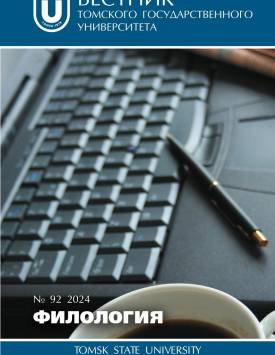Media of diaspora groups in Kazakhstan: Problems of cultural identity
The article first presents an analysis of the post-Soviet stage of diaspora groups existence in Kazakhstan. The diasporas of Kazakhstan are analyzed in two relevant aspects: the organizational form of diaspora activities and the methods they use to form identity. Nowadays various forms of media serve as the main means of diaspora identity formation. The article describes the methods of media representation of national minorities in the socio-cultural space of Kazakhstan. The coverage of diaspora issues in the Kazakhstani media is separately examined. In this case, the thematic lists and narratives of Kazakhstani mass media and national media coincide: a simplified and censored version of historical data about the diaspora, the presentation of its national ethnographic characteristics, and the traditional narrative of interethnic fraternity. The main research results are defined by both the author's approach and the theory and practice of the medialogical approach. Special attention is paid to the disproportional use of traditional and new forms of media to express the interests of national diasporas and their narratives. As presented in the article, a combination of republican ethnic publications and independent new media has become a form of social control and a means of diaspora identity formation in Kazakhstan. Communication channels for diasporas in Kazakhstan are limited, standardized, and mainly consist of publications under the guidance of the republican ethnic association, with very few independent new media outlets. For this reason, ethnic publications offer their limited thematic scope, avoiding complex and conflicting aspects of diaspora life and activities in their media products. Many ethnic media outlets in the country have an archaic information-propagandistic nature derived from the program documents of the social associations themselves, which classifies ethnic media as presentation sources rather than real mass media. Simultaneously, the article presents diasporas that have managed to create not only professional media products but also preserve the history and contemporary realities of the diaspora, including in digital format. The conclusion offers possible ways to overcome the information crisis faced by diaspora associations in Kazakhstan. The author declares no conflicts of interests.
Keywords
diaspora community, critical discourse analysis, ethnic association, ethnojournalism, media, medialogical approachAuthors
| Name | Organization | |
| Gizdatov Gazinur G. | Kazakh Ablai Khan University of International Relations and World Languages | gizdat@mail.ru |
References

Media of diaspora groups in Kazakhstan: Problems of cultural identity | Vestnik Tomskogo gosudarstvennogo universiteta. Filologiya – Tomsk State University Journal of Philology. 2024. № 92. DOI: 10.17223/19986645/92/13
